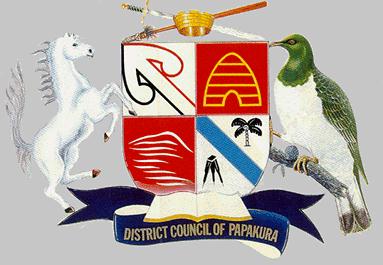Papakura
| Heraldry of the World Civic heraldry of New Zealand |
PAPAKURA
Local authority : Auckland
Origin/meaning
The first quarter shows the liberating emblem of life known in Maori as mauri ora which portrays a continuum with ancestors, the origins of the universe, and the beginning of life,be it a child, a plant, or an idea in the minds of men or women. This symbol also has a continuity with the future. And as well, it captures the primeval forests which abounded Papakura flats centuries ago. The Koru also symbolises our social, cultural and geographical associations with the South Pacific and the origins of Polynesian heritage.
The second quarter shows a beehive. While the beehive represents industry, nature and the rural elements of the District Council, it also reminds us that one of New Zealand's most distinguished sons, Sir Edmund Hillary, was a Papakura bee-keeper.
The third quarter shows Puke-Kiwi-Riki, the sacred red-hill mountain, once the domain of a diminutive chief, Kiwi, a Ngati-Paoa chief. Though small in the physical presence, a giant in leadership stature, and a man of peace. The horizontal lines represent the name of Papakura - papa as flat, and kura is the precious red earth. (Papa is the abbreviation of Papatuanuku, the Maori word of land.)
As a primeval substance, water represents the spiritual and physical essence of life. The essential life-giving components of water comes from the purity of the earth. The Hunua Ranges supply Auckland authorities with its water, and those same organisations are joining with iwi authorites to make a concerted effort to clean up the Manukau Harbour. The Waikato River reflects Papakura's associations with the tangata whenua. This is all symbolised by the blue bend in the fourth quarter. The kereru (New Zealand pigeon) supporter is a bird of peace, and is frequently seen in Papakura feeding off the Miro, Tataire and Puriri berries. For Maori people the kereru is revered and was taken ceremoniously for food and for its prized feathers. A great deal of tapu and rahui (prohibitions) surrounded the taking of kereru. The female kereru is shown sitting on a kauri branch and one kauri cone.
The horse symbolises the breeding, training and marketing of fine stock in Papakura, Ardmore, Takanini and Alfriston, and as well representing youth, outdoor recreation and the various sporting pursuits in the District.The crown demonstrates the allegiance to the monarch as the foundation of our democratic process, and superimposes the weapons of war, the sword and the taiaha in the inverted positions of peace. Papakura has a long military history where the Hunua Ranges feature.
The Bible at the base of the shield stands for the principles of morality and justice, and the faith in the beliefs and values of other people.
Contact and Support
Partners:
Your logo here ?
Contact us
© since 1995, Heraldry of the World, Ralf Hartemink
Index of the site
Literature : Information obtained from the Papakura Council.

